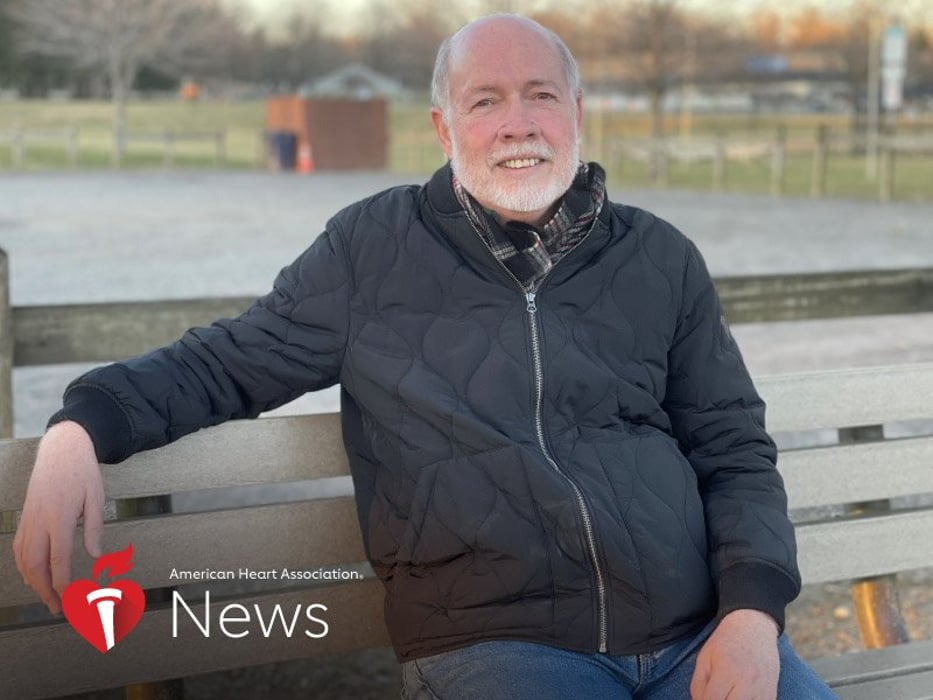AHA News: On a Snowy Day, the Warmth of a Stranger Kept One Man Alive

TUESDAY, April 18, 2023 (American Heart Association News) -- In the early months of 2021, heavy snow blanketed the city of Philadelphia.
Justin Stroh and his wife, Bess, both in their 60s, had been taking turns shoveling the snow in front of their suburban home. On a Monday in February, the snow was falling fast and hard, dumping 1 to 2 inches an hour before mixing with rain. The combination made it too heavy to clear. The Strohs considered taking a long walk with Michael, their Labrador mix, but decided it was too slick to walk safely.
Bess settled in to work in a back bedroom, where she'd created a makeshift office during the pandemic. But Justin suddenly decided he needed to tackle the sidewalk. He stepped out without telling his wife. He doesn't know why, because he has no memory of that day – or the days and weeks that followed.
Justin collapsed in front of their home, far from where Bess could've seen or heard him. He was lying there, lifeless, when Jennifer Kennedy drove by on her way to pick up her son from school.
"I happened to see in my peripheral vision that there was a guy lying in the snow," Kennedy said. She pulled her car over, climbed around a snowbank and called out to him. Getting no response, she called 911 and began CPR. Having been trained as a cardiac surgical nurse, she knew exactly what to do.
Kennedy's efforts were the first in a series of events that likely saved Justin's life – and his brain function.
Nine out of 10 people who go into cardiac arrest outside a hospital die. Many of those who are resuscitated die before being discharged from the hospital due to injuries to their brain and vital organs from lack of oxygen when their heart stopped. But those who get CPR from a bystander have double the chance of survival.
There are many reasons people can go into cardiac arrest. Heart attacks – more common during periods of heavy snowfall, when shoveling places extra stress on the heart – are one of them. It was a heart attack, stemming from a blocked artery, that caused Justin's cardiac arrest.
Emergency medical professionals restored Justin's heartbeat. However, he spent about three months in the hospital, an odyssey that included a month spent in a medically induced coma and a bout with pneumonia resulting from the insertion of a breathing tube during his ambulance ride. Along the way, kidney problems prompted temporary dialysis.
Just as he was starting to recover, he came down with COVID-19. Until this time, Bess had stayed by his side in the ICU, reading to her husband, playing music and talking to him. So it was no surprise that when he got COVID-19, she did, too.
Another challenge Justin overcame was some temporary cognitive issues. Once conscious again, he had to relearn how to speak. And how to walk. He also has some memory loss. The last thing he remembers is being at a museum in New York with his daughter, something that happened two weeks before his collapse.
"I look normal, but I still suffer from a few things," he said. "I am incredibly easily winded. I can't do very much."
What he can do is walk 2 miles on a treadmill, lift some weights and spend 10 minutes on the elliptical machine, but it exhausts him. He can speak, but he sometimes struggles to find the right words. He had to retire from his job as a research scientist. He now spends his time trying to piece his story together and look for ways to turn what happened to him into something positive, like getting involved with the American Heart Association.
He remains eternally grateful for the lifesaving help he received from Kennedy, the woman who gave him CPR, and the medical professionals who never gave up on him. The list includes a speech therapist and a team of respiratory specialists.
"He worked with some really extraordinary people," Bess said. "They invested in him and believed in him. That makes a huge difference."
Justin thinks of these people often, especially Kennedy. While he has no memory of what she did for him, he knows he wouldn't be alive without her and has called to tell her so. He sends her a box of Christmas cookies every year. Kennedy, who added the Strohs to her Christmas card list, said the cookies make her smile.
Not half as wide as Justin.
American Heart Association News covers heart and brain health. Not all views expressed in this story reflect the official position of the American Heart Association. Copyright is owned or held by the American Heart Association, Inc., and all rights are reserved.
By Laura Williamson, American Heart Association News
Related Posts
Glycated Hemoglobin Lower With Continuous Glucose Monitoring in T1DM
MONDAY, Oct. 17, 2022 (HealthDay News) -- Use of intermittently scanned...
Are ERs Safe? Patients, Nurses and Doctors Say No in New Survey
FRIDAY, May 26, 2023 (HealthDay News) -- Emergency departments aren’t perceived...
Beber alcohol no hace que los demás parezcan más atractivos, según un estudio
MIÉRCOLES, 30 de agosto de 2023 (HealthDay News) -- Muchas personas han culpado...
La pandemia provoca el escrutinio de unas prácticas ‘obsoletas’ de control de las infecciones
MIÉRCOLES, 10 de noviembre de 2021 (HealthDay News) -- La pandemia de la...
